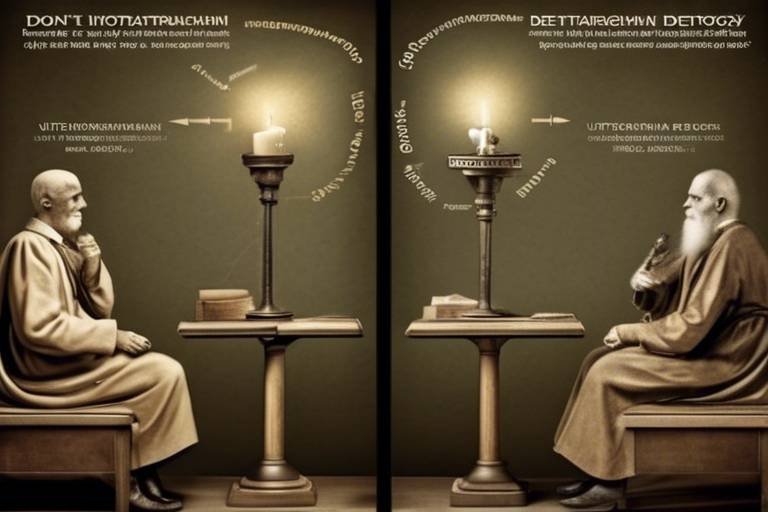Utilitarianism Vs. Deontology - A Comparative Analysis
This article explores the fundamental differences between utilitarianism and deontology, two prominent ethical theories. We will delve into their principles, applications, and implications for moral decision-making.
Utilitarianism is an ethical theory that focuses on the outcomes of actions. The core idea is pretty straightforward: actions are deemed right if they promote the greatest happiness for the greatest number of people. This principle is often referred to as the greatest happiness principle. Imagine a scenario where your decision can either benefit a few individuals significantly or benefit many individuals slightly. According to utilitarianism, the choice that maximizes overall happiness is the right one. This approach evaluates the morality of actions based on their consequences, which can sometimes lead to surprising conclusions. For instance, a utilitarian might argue that sacrificing one life to save ten is justifiable if it results in a net increase in happiness.
On the flip side, we have deontology, which emphasizes the importance of duty and moral rules. This theory, largely attributed to philosopher Immanuel Kant, posits that certain actions are inherently right or wrong, regardless of their consequences. Kant's categorical imperative is a key tenet of deontological ethics, suggesting that we should act only according to that maxim whereby we can at the same time will that it should become a universal law. In simpler terms, if you wouldn't want everyone to act a certain way, then you shouldn't act that way either. Deontology is like a moral compass that guides individuals to adhere to their duties and obligations, even when the outcomes might not lead to the greatest happiness.
Utilitarianism is built on several key principles that guide ethical decision-making:
- Consequentialism: The morality of an action is determined by its outcomes.
- Hedonism: Happiness or pleasure is the highest good.
- Measurement of Happiness: Utilitarianism seeks to quantify happiness and make decisions based on maximizing it.
These principles collectively create a framework where actions are evaluated based on their ability to produce positive outcomes. However, this approach can sometimes lead to dilemmas, such as when the happiness of the majority comes at the expense of the minority.
Within utilitarianism, there's a distinction between act utilitarianism and rule utilitarianism. Act utilitarianism assesses individual actions based on their outcomes. For example, if lying in a specific situation leads to a greater overall happiness, then lying is considered the right action. In contrast, rule utilitarianism evaluates the consequences of following certain rules. It suggests that adhering to rules that generally promote happiness is more beneficial in the long run. This distinction is crucial for understanding the practical applications of utilitarian ethics and how they can vary in different contexts.
Despite its appeal, utilitarianism faces several criticisms. One major challenge is the difficulty of quantifying happiness. How do we measure happiness or suffering? Moreover, critics argue that utilitarianism can neglect individual rights. For instance, if sacrificing one person leads to a greater overall good, is it morally acceptable? This potential for injustice raises important questions about the validity of utilitarian ethics in real-world scenarios.
Deontology is founded on principles that prioritize intentions and moral duties. Here are some of its fundamental concepts:
- Intentions Matter: The morality of an action is based on the actor's intentions rather than the outcomes.
- Moral Duties: Individuals have obligations to act in accordance with moral rules.
- Perfect vs. Imperfect Duties: Perfect duties must always be followed, while imperfect duties are more flexible.
This framework encourages individuals to act based on their duties and moral obligations, often leading to a more principled approach to ethics.
However, deontology is not without its critiques. Many argue that it can be overly rigid, failing to consider the consequences of actions. For instance, if following a moral rule leads to significant harm, deontologists may struggle to justify their stance. This rigidity can lead to dilemmas where adhering to duty conflicts with achieving better outcomes.
When we compare utilitarianism and deontology, the differences in their approaches to ethics become evident. Utilitarianism is outcome-oriented, focusing on maximizing overall happiness, while deontology is rule-oriented, emphasizing moral duties and intentions. In real-world applications, utilitarianism may lead to more flexible decision-making, adapting to circumstances, whereas deontology offers a strong framework of principles that can be relied upon even in challenging situations.
- What is the main difference between utilitarianism and deontology? Utilitarianism focuses on the consequences of actions, while deontology emphasizes moral duties and rules.
- Can utilitarianism justify unethical actions? Yes, it can potentially justify actions that harm individuals if the overall happiness is increased.
- Is deontology too rigid? Critics argue that deontology can be inflexible, sometimes leading to poor outcomes if moral rules are followed without considering consequences.

Understanding Utilitarianism
Utilitarianism is an ethical theory that revolves around the idea that the **morality** of an action is determined by its **consequences**. At its core, this theory posits that the best action is the one that maximizes overall happiness or **utility**. Imagine a scale where one side represents happiness and the other represents suffering; utilitarianism aims to tip the scale in favor of happiness. This approach is often summarized by the phrase, "the greatest good for the greatest number," which encapsulates the essence of utilitarian thought.
The foundation of utilitarianism lies in the **greatest happiness principle**. This principle asserts that actions are morally right if they promote happiness and wrong if they produce the opposite. To further understand this concept, let’s break it down:
- Consequentialism: This is the backbone of utilitarianism. It emphasizes that the outcomes of actions are what count. If an action leads to positive results, it is deemed ethical.
- Hedonism: Utilitarianism often aligns with hedonistic principles, which suggest that pleasure or happiness is the highest good. In this view, actions that increase pleasure or reduce pain are preferred.
- Measurement of Happiness: Utilitarianism requires a method to measure happiness, which can be quite complex. Different forms of happiness or pleasure can be difficult to quantify, leading to challenges in ethical decision-making.
Utilitarianism can be applied in various contexts, from personal choices to public policy. For instance, when a government decides to allocate resources for healthcare, it often weighs the potential benefits to the population against costs. If the outcome leads to a greater overall benefit, such as improved health and well-being for the majority, then the action is justified under utilitarian principles. However, it’s important to note that utilitarianism can sometimes lead to controversial decisions, such as sacrificing individual rights for the sake of the majority's happiness. This raises the question: should the happiness of many outweigh the suffering of a few?
Utilitarianism is not without its complexities and challenges. Critics often point out that measuring happiness can be subjective and varies from person to person. Additionally, the theory might overlook the **rights** of individuals, leading to situations where the needs of a minority are ignored in favor of a majority. Despite these criticisms, utilitarianism remains a powerful framework for evaluating moral dilemmas, especially in a world where our decisions can have far-reaching consequences.
In summary, understanding utilitarianism requires an appreciation of its focus on outcomes and the overarching goal of maximizing happiness. While it offers a clear and pragmatic approach to ethics, it also invites critical examination of its implications on individual rights and the subjective nature of happiness. As we continue to explore ethical theories, utilitarianism serves as a vital lens through which we can analyze our moral decisions.

Understanding Deontology
Deontology is an ethical theory that places a significant emphasis on the concept of duty and the adherence to moral rules. Unlike utilitarianism, which evaluates the morality of actions based on their outcomes, deontology asserts that certain actions are inherently right or wrong, regardless of the consequences they produce. This principle can often lead to intriguing moral dilemmas, as individuals may find themselves torn between following a strict moral code and achieving a favorable outcome. At the heart of deontological ethics is the belief that our intentions matter just as much—if not more—than the results of our actions.
One of the most influential figures in deontological ethics is Immanuel Kant, whose categorical imperative serves as a foundational concept. Kant's idea is that one should act only according to that maxim which they can, at the same time, will that it should become a universal law. In simpler terms, before you act, consider whether you would want everyone else to act in the same way. This principle encourages individuals to think critically about their actions and the moral implications they carry.
Deontology can be divided into two primary categories: perfect duties and imperfect duties. Perfect duties are those that must always be followed, such as telling the truth and keeping promises. On the other hand, imperfect duties, while still important, allow for some flexibility in how they are fulfilled. For instance, helping others is an imperfect duty; you should do it when you can, but you're not obligated to help every single time. This distinction helps individuals navigate the complexities of ethical decision-making, balancing rigid moral obligations with the realities of everyday life.
Moreover, deontology raises compelling questions about the nature of morality. For example, if lying could save a life, does the moral obligation to tell the truth still hold? Such scenarios challenge the rigidity of deontological principles, prompting debates about whether strict adherence to moral laws can sometimes lead to negative outcomes. This tension between duty and consequence is a core aspect of deontological ethics, making it a rich field for philosophical inquiry.
In practice, deontological ethics can guide individuals in various fields, such as law, medicine, and business. Professionals in these areas often face ethical dilemmas where they must choose between following established rules and achieving beneficial outcomes. For instance, a doctor may grapple with the decision to withhold information from a patient for their own good, raising questions about patient autonomy and the moral obligation to inform. These real-world applications illustrate how deontological principles can shape decision-making processes, leading to a more principled approach to ethics.
In summary, understanding deontology involves recognizing its foundational principles, such as the significance of duty, moral rules, and the importance of intentions. While it offers a framework for ethical decision-making, it also invites critical discussions about the complexities of morality and the challenges of applying rigid rules in a nuanced world.
- What is deontology? Deontology is an ethical theory that emphasizes duties and moral rules over the consequences of actions.
- Who is the main proponent of deontological ethics? Immanuel Kant is a key figure in deontological ethics, known for his concept of the categorical imperative.
- What are perfect and imperfect duties? Perfect duties must always be followed, while imperfect duties allow for flexibility in their fulfillment.
- How does deontology differ from utilitarianism? Deontology focuses on the morality of actions based on rules and duties, whereas utilitarianism evaluates actions based on their outcomes and the happiness they produce.

Key Principles of Utilitarianism
Utilitarianism is a fascinating ethical theory that revolves around the idea that the morality of an action is determined by its outcomes. At its core, it promotes the notion of maximizing overall happiness or utility. This principle is often encapsulated in the phrase "the greatest happiness for the greatest number." But what does this really mean? Imagine a scenario where a community faces a decision that could either benefit a few individuals significantly or provide a moderate benefit to many. A utilitarian would advocate for the option that leads to the highest total happiness, even if it means sacrificing the well-being of a few.
One of the key tenets of utilitarianism is consequentialism, which asserts that the rightness or wrongness of an action is solely based on its consequences. This means that a good action is one that produces positive outcomes, while a bad action results in negative outcomes. To illustrate this, consider a doctor who has to decide whether to allocate a limited supply of medicine to one critically ill patient or to several patients with less severe conditions. A utilitarian approach would suggest that the doctor should distribute the medicine in a way that maximizes the overall benefit, potentially saving more lives, even if it means one patient does not receive the treatment they desperately need.
Another important aspect of utilitarianism is hedonism, which posits that pleasure or happiness is the highest good. This perspective emphasizes the importance of experiencing joy and minimizing suffering. However, hedonism in utilitarianism is not about pursuing momentary pleasures; rather, it focuses on long-term happiness. It encourages individuals to consider the broader implications of their actions on collective well-being.
To help clarify how utilitarianism evaluates happiness, we can look at the following dimensions:
| Dimension | Description |
|---|---|
| Intensity | The strength of the pleasure or pain resulting from an action. |
| Duration | The length of time that the pleasure or pain lasts. |
| Certainty | The likelihood that the action will produce the expected outcome. |
| Proximity | The closeness of the pleasure or pain to the action. |
| Fecundity | The potential for the action to produce further pleasures or pains. |
| Purity | The chance that the pleasure will not be followed by pain. |
These dimensions help individuals weigh the potential outcomes of their actions, guiding them toward decisions that are likely to produce the most happiness. However, it's essential to recognize that measuring happiness can be quite complex and subjective. What brings joy to one person may not have the same effect on another, leading to challenges in applying utilitarian principles consistently.
In summary, the key principles of utilitarianism revolve around the ideas of consequentialism and hedonism, emphasizing the importance of outcomes and the pursuit of happiness. While this ethical framework offers a straightforward approach to moral decision-making, it also raises questions about the complexities of human experiences and the challenge of quantifying happiness. As we delve deeper into the world of ethics, understanding these principles is crucial for navigating the intricate landscape of moral dilemmas.

Act vs. Rule Utilitarianism
When diving into the waters of utilitarianism, it’s essential to distinguish between act utilitarianism and rule utilitarianism. These two branches of utilitarian thought offer different perspectives on how to evaluate the morality of actions. At its core, act utilitarianism is all about the specific actions and their direct consequences. It suggests that we should evaluate each action individually, asking ourselves, "Does this action produce the greatest happiness for the greatest number?" This approach can lead to some surprising conclusions, as it allows for flexibility based on the situation. For example, if lying in a particular instance leads to a greater overall happiness, then that lie might be considered morally acceptable.
On the other hand, rule utilitarianism takes a broader view. Instead of assessing individual actions, it focuses on the consequences of following certain rules. The idea here is to establish guidelines that, when adhered to, will generally lead to the greatest happiness. For instance, a rule might state that "honesty is the best policy," and while there may be exceptions where lying could yield better outcomes, adhering to this rule tends to promote overall trust and stability in society. This distinction is crucial because it highlights a fundamental difference in how we approach ethical decision-making.
To further clarify, consider the following comparison:
| Aspect | Act Utilitarianism | Rule Utilitarianism |
|---|---|---|
| Focus | Individual actions and their outcomes | General rules and their overall consequences |
| Flexibility | Highly flexible; context matters | Less flexible; adherence to rules is key |
| Evaluation | Each action is evaluated on a case-by-case basis | Rules are evaluated based on their overall utility |
| Examples | Lying to save a life | Following a rule of honesty |
Each approach has its merits and drawbacks. Act utilitarianism can lead to moral dilemmas where the right action is not clear-cut, while rule utilitarianism can sometimes overlook unique situations that might warrant exceptions to established rules. The challenge for ethical thinkers is to find a balance between these two approaches, ensuring that we consider both the immediate consequences of our actions and the long-term implications of the rules we choose to follow. This nuanced understanding of utilitarianism not only enriches our moral framework but also invites us to engage more thoughtfully with the ethical dilemmas we encounter in everyday life.
- What is the main difference between act and rule utilitarianism? Act utilitarianism focuses on the consequences of individual actions, while rule utilitarianism emphasizes the importance of following rules that generally lead to the best outcomes.
- Can you give an example of act utilitarianism? Sure! If someone lies to protect a friend from harm, act utilitarianism would evaluate that lie based on the happiness it creates in that specific instance.
- What are the criticisms of act utilitarianism? Critics argue that it can justify morally questionable actions in certain situations, leading to a slippery slope of ethical decision-making.
- How does rule utilitarianism handle exceptions? Rule utilitarianism may struggle with exceptions, as it prioritizes adherence to rules, which can sometimes overlook unique circumstances requiring flexibility.

Critiques of Utilitarianism
Utilitarianism, while widely recognized as a significant ethical framework, is not without its fair share of critiques. One of the most prominent challenges to this theory is the difficulty in quantifying happiness. How do we measure happiness, and can we truly compare the joy of one individual to the suffering of another? This question raises a fundamental issue: the subjective nature of happiness makes it nearly impossible to create a universal standard for measuring the outcomes of our actions. This brings us to the idea that utilitarianism may oversimplify complex moral situations, reducing them to mere calculations of pleasure and pain.
Another critical critique revolves around the potential neglect of individual rights. Imagine a scenario where the majority's happiness hinges on the suffering of a minority. Utilitarianism might justify such an action if it maximizes overall happiness, leading to a moral dilemma. This raises questions about the ethical implications of sacrificing individual rights for the greater good. Critics argue that this can lead to a slippery slope where the ends justify the means, potentially endorsing harmful practices as long as they benefit the majority.
Moreover, utilitarianism can sometimes be perceived as too flexible, allowing for moral relativism. What happens when the definition of happiness changes over time or across cultures? This flexibility may lead to ethical inconsistencies, making it challenging to uphold a stable moral framework. In essence, while the theory aims for a practical approach to ethics, its adaptability might result in a lack of clear moral guidelines.
Lastly, the theory's focus on outcomes can overshadow the importance of intentions. For instance, consider a situation where a person acts with good intentions but inadvertently causes harm. Under utilitarianism, the focus would solely be on the consequences, potentially disregarding the moral weight of the individual's intentions. This raises the question: should we not also consider the morality of our intentions when evaluating ethical behavior?
In summary, while utilitarianism offers a compelling approach to ethical decision-making, its critiques highlight significant limitations. The challenges of measuring happiness, the potential neglect of individual rights, the risk of moral relativism, and the overshadowing of intentions all contribute to a broader conversation about the validity and applicability of this ethical theory. As we navigate through complex moral landscapes, it's crucial to consider these critiques to develop a more rounded understanding of ethics.
- What is the main criticism of utilitarianism? The main criticism is its challenge in quantifying happiness and the potential neglect of individual rights.
- How does utilitarianism handle moral dilemmas? Utilitarianism evaluates actions based on their consequences, which can sometimes justify harmful actions if they maximize overall happiness.
- Can utilitarianism be applied universally? While it aims to provide a universal approach to ethics, cultural differences in understanding happiness can complicate its application.

Key Principles of Deontology
Deontology, a term derived from the Greek words "deon" (duty) and "logos" (study), fundamentally revolves around the concept of duty and the adherence to moral rules. Unlike utilitarianism, which evaluates the morality of actions based on their consequences, deontological ethics emphasizes that certain actions are intrinsically right or wrong, regardless of the outcomes they produce. This ethical framework was notably advanced by the German philosopher Immanuel Kant, who introduced the idea of the categorical imperative. This principle asserts that one should act only according to that maxim whereby they can, at the same time, will that it should become a universal law. In simpler terms, if you believe an action is acceptable, you must also believe that everyone should be able to perform that same action without contradiction.
At the heart of deontological ethics lies the importance of intentions. It posits that the morality of an action is primarily determined by the actor's intentions rather than the results produced. For instance, if a person tells the truth with the intent to harm someone, the action is still considered morally wrong, despite the positive outcome of honesty. This focus on intentions introduces the notion of moral duties, which can be categorized into two main types:
- Perfect Duties: These are obligations that must always be followed, such as the duty not to lie or steal. They are absolute and leave no room for exceptions.
- Imperfect Duties: These duties are more flexible and allow for some discretion in how they are fulfilled. For example, the duty to help others is important, but it can be fulfilled in various ways depending on circumstances.
Deontology also introduces the concept of moral rights, which are inherent entitlements that individuals possess. These rights must be respected and protected, regardless of the potential consequences. This aspect of deontological ethics highlights the importance of individual autonomy and dignity. It serves as a reminder that while the greater good is important, it should never come at the expense of an individual's rights or moral agency. In practice, this means that actions such as lying, cheating, or harming others can never be justified, even if they lead to beneficial outcomes for the majority.
Moreover, deontological ethics encourages individuals to reflect on their moral principles and the rules that govern their behavior. It challenges us to consider whether our actions align with our values and whether we are upholding our duties to ourselves and others. This introspective approach fosters a deeper understanding of our moral landscape and encourages ethical consistency in our decision-making processes.
In summary, the key principles of deontology underscore the significance of duty, intention, and moral rules in ethical reasoning. By focusing on the inherent morality of actions rather than their consequences, deontology provides a robust framework for navigating the complexities of moral decision-making. While it may face critiques for its rigidity, the emphasis on individual rights and moral duties remains a powerful aspect of this ethical theory.
- What is the main difference between utilitarianism and deontology? Utilitarianism focuses on the consequences of actions to determine their morality, while deontology emphasizes the inherent rightness or wrongness of actions based on duty and moral rules.
- Can deontological principles change over time? While the core duties may remain stable, interpretations of moral rules can evolve based on cultural and societal changes.
- Is it possible to combine utilitarianism and deontology? Some philosophers argue for a hybrid approach, suggesting that while duties are important, considering the consequences can also enrich moral decision-making.

Critiques of Deontology
Deontology, while a robust ethical framework, is not without its critics. One of the primary critiques is its perceived rigidity. Deontologists adhere strictly to moral rules, which can sometimes lead to outcomes that seem counterintuitive or even harmful. For instance, imagine a situation where telling the truth could lead to significant harm for another person. A deontologist would argue that one must always tell the truth, regardless of the consequences, which raises the question: is it ethical to uphold a rule at the expense of someone's well-being?
Moreover, critics argue that deontology fails to account for the complexities of real-life situations. Life is rarely black and white, and moral dilemmas often present shades of gray. In this context, the strict adherence to moral duties can result in a lack of flexibility. For example, consider a scenario where a person has a duty to keep a promise, but fulfilling that promise could lead to a greater harm. Deontological ethics can struggle to provide a satisfactory resolution in such cases, leaving individuals grappling with feelings of moral distress.
Additionally, the distinction between perfect and imperfect duties can be a source of confusion. Perfect duties are those that must always be followed, such as the duty not to lie. On the other hand, imperfect duties, like the duty to help others, are more flexible and can be fulfilled at one’s discretion. Critics argue that this distinction can lead to inconsistencies in moral reasoning. It raises questions about how one prioritizes duties and whether some duties are more significant than others. This inconsistency can undermine the theory's overall credibility.
Another significant critique revolves around the lack of consideration for consequences. Deontologists might argue that the morality of an action should not be judged based on its outcomes, but this perspective can lead to morally questionable decisions. For example, if a deontologist refuses to break a promise to a friend, knowing that doing so could prevent a serious harm, one might wonder if adhering to the rule is truly the most ethical choice. This unwavering commitment to duty can sometimes result in outcomes that are not only undesirable but also ethically problematic.
In summary, while deontology offers a clear-cut approach to ethics with its focus on duty and rules, it faces significant critiques regarding its rigidity, complexity, and lack of consideration for consequences. These critiques highlight the challenges of applying deontological principles in real-world scenarios, prompting ongoing debates about the effectiveness and applicability of this ethical framework.
- What is deontology? Deontology is an ethical theory that emphasizes the importance of following moral rules and duties, regardless of the consequences.
- What are some critiques of deontology? Critics argue that deontology can be rigid, leading to morally questionable outcomes, and that it struggles with the complexities of real-life situations.
- How does deontology differ from utilitarianism? While deontology focuses on the morality of actions based on duties, utilitarianism evaluates actions based on their consequences and the overall happiness they produce.
- Can deontology be applied in everyday decision-making? Yes, many people use deontological principles in daily life, but the challenges of applying strict rules can lead to moral dilemmas.

Comparative Analysis of Both Theories
When diving into the fascinating world of ethics, comparing utilitarianism and deontology reveals not just their differences but also their unique strengths and weaknesses. Both theories offer a framework for understanding morality, yet they approach ethical dilemmas from contrasting perspectives. Utilitarianism, with its focus on the outcomes of actions, prompts us to ask: "What will produce the greatest happiness for the greatest number?" This consequentialist viewpoint emphasizes the results of our choices, often leading to a more flexible approach to morality. On the other hand, deontology, rooted in duty and moral rules, insists that some actions are categorically right or wrong, regardless of their consequences. It challenges us with questions like, "Is it ever acceptable to lie, even if it could lead to a better outcome?"
To further illustrate their differences, let’s explore how each theory handles real-world scenarios. For instance, consider a situation where a doctor must decide whether to allocate a limited supply of a life-saving drug. A utilitarian approach would evaluate the potential outcomes: administering the drug to those who will benefit the most and save the greatest number of lives. In contrast, a deontological perspective would focus on the moral duty to treat all patients equally, regardless of the potential outcomes. This fundamental clash illustrates how utilitarianism prioritizes the end results, while deontology emphasizes adherence to moral principles.
Another key aspect to compare is the flexibility of each theory. Utilitarianism often adapts to the context of a situation, allowing for a more pragmatic approach to ethical decision-making. However, this flexibility can lead to moral dilemmas where individual rights might be overlooked. For example, if sacrificing one person could save five others, a strict utilitarian might argue for the sacrifice. In contrast, deontology's rigidity ensures that certain rights are protected, but it can also lead to morally questionable outcomes. The insistence on following rules may prevent actions that could save lives, thus creating a potential clash between duty and compassion.
To summarize the comparative analysis, we can look at the following table that encapsulates the core differences between utilitarianism and deontology:
| Aspect | Utilitarianism | Deontology |
|---|---|---|
| Focus | Consequences of actions | Moral duties and rules |
| Decision-making | Greatest happiness principle | Categorical imperative |
| Flexibility | Flexible, context-dependent | Rigid, rule-based |
| Individual rights | Potentially overlooked | Strongly protected |
Ultimately, the choice between utilitarianism and deontology may depend on the context of the ethical dilemma at hand. Each theory provides valuable insights, yet neither is without its flaws. The challenge lies in finding a balance that respects individual rights while also considering the greater good. Engaging with both theories can enrich our understanding of ethics, prompting us to think critically about our moral choices in a complex world.
- What is the main difference between utilitarianism and deontology?
Utilitarianism focuses on the outcomes of actions to determine their morality, while deontology emphasizes the importance of following moral rules and duties, regardless of the consequences.
- Can utilitarianism justify harmful actions?
Yes, utilitarianism can sometimes justify harmful actions if they result in a greater overall good, which is one of its main criticisms.
- Why is deontology considered rigid?
Deontology is considered rigid because it adheres strictly to moral rules and duties, potentially ignoring the consequences of actions.
- How can these theories be applied in real life?
Both theories can be applied in various fields, such as medicine, law, and public policy, to guide ethical decision-making processes.
Frequently Asked Questions
- What is the main difference between utilitarianism and deontology?
Utilitarianism focuses on the outcomes of actions, aiming for the greatest happiness for the greatest number, while deontology emphasizes the importance of moral duties and rules, asserting that some actions are inherently right or wrong, regardless of their consequences.
- How does utilitarianism evaluate the morality of an action?
Utilitarianism evaluates morality based on the consequences of an action. If the action leads to more overall happiness or reduces suffering, it is considered morally right. This approach is often summarized by the greatest happiness principle.
- What are the key principles of deontology?
The key principles of deontology include the importance of intentions behind actions, adherence to moral duties, and the distinction between perfect duties (which must always be followed) and imperfect duties (which are more flexible). These principles guide moral decision-making in a way that prioritizes duty over consequences.
- Can you explain the difference between act and rule utilitarianism?
Act utilitarianism assesses individual actions based on their specific outcomes, while rule utilitarianism evaluates the consequences of following general rules. In essence, act utilitarianism is about the immediate impact of each action, whereas rule utilitarianism considers the long-term benefits of adhering to certain rules.
- What are some common critiques of utilitarianism?
Critiques of utilitarianism often include the difficulty of quantifying happiness, the potential for justifying harmful actions if they result in a greater overall good, and the neglect of individual rights. These concerns raise questions about the theory's practicality and moral integrity.
- What are the criticisms of deontology?
Deontology is often criticized for being too rigid and not considering the consequences of actions. Critics argue that this inflexibility can lead to morally questionable outcomes, as it prioritizes adherence to rules over the potential impact of those actions on people's lives.
- How do utilitarianism and deontology apply in real-world scenarios?
In real-world scenarios, utilitarianism might be applied in policy-making where the goal is to maximize overall well-being, while deontology could guide professionals like doctors or lawyers in adhering to ethical standards and duties, regardless of the potential outcomes of their decisions.



















